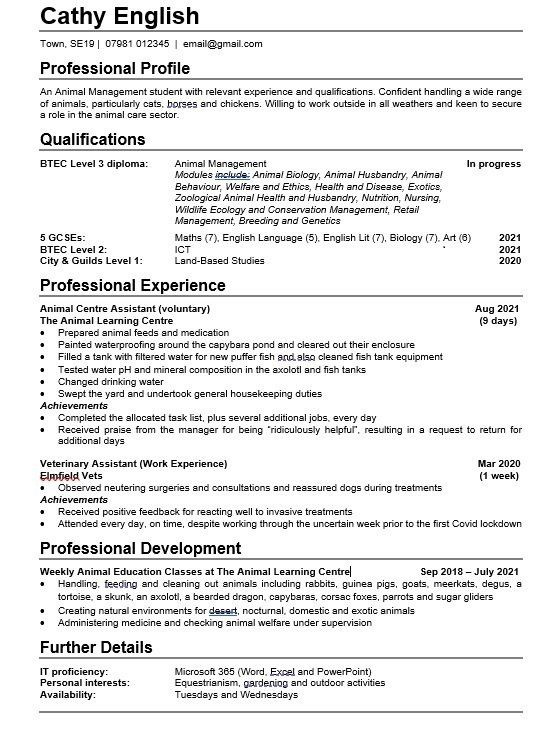How to write a CV with no experience (with example)
Staring at a blank page, with the ultimate aim of convincing someone to hire you, can be overwhelming whatever stage of your career you’re at. When you’re writing a CV with no experience behind you, however, it can be an even more dauting task. How can you fill the space?!
Never fear! CV Shed has some top tips on how to write a CV with no experience that will not only impresses recruiters but will also give you confidence as you enter the job market for the first time.
How do I start a CV for my first job?
Start at the top with your name and contact details. Add your given name and your surname - if you'd prefer to be known by a nickname at work, it's fine to use that on your CV. Your contact details should include your location (town and first part of your postcode), mobile number and email address. If you have a LinkedIn profile you can add a link to that as well, but don't worry if you don't have one. Links to other social media sites should definitely be avoided, though.
How can I make a good impression?
After your name and contact details, you’ll need to introduce yourself with a Professional Profile. As you’re at an early stage in your career, this will probably need to focus on your soft skills, your qualifications and your professional interests. This is one of the first impressions you’ll make on a hiring manager, so put plenty of effort into really selling yourself. Give the recruiter a reason to carry on reading your CV and a reason to think you may be the right person for the role.
Try to avoid using cliches such as Hardworking, Enthusiastic and Reliable - words like these are really overused. Instead of saying that you're reliable, for example, try to give a concrete example - such as 100% attendance or zero late marks.
What skills should I put on my first CV?
Even though you have no experience in the world of work, that doesn’t mean that you have no experience at all. Throughout your life you’ve been acquiring skills, so consider what they may be. If you play on a football team, you have team working skills. If you’re the Captain, you have leadership skills. If you arrange the matches, you have organisational skills. If you’re the referee, you have decision making skills. You get the picture!
Skills don’t just come from paid work, so have a think about what you’ve done – in any capacity – that will demonstrate your abilities on your first CV. It always helps to read the job adverts for some roles you’re interested in, before you start writing your CV, to see what skills are most in demand.
Don't worry if you don't have any hard skills to include at the moment. For entry-level roles, soft skills and attitude are more important - employers expect to train you in the hard skills needed for the role.
How do I include qualifications on my CV?
If you’re writing a CV for your first job, it’s likely that you’re still at school, college or university and therefore haven't finished your education. That’s fine! You can still include qualifications you haven't quite completed, as long as you make it clear that they’re “in progress” or “awaiting results”. Don’t forget to add the level and subject of each qualification. If you've completed them, add the grades too - as long as they're decent! For university-level qualifications, you can show off your expertise and interests by listing key modules and projects, too.
How can I write a CV with no experience?
When it comes to writing your first CV, pretty much any experience is worth considering! A CV isn’t just about paid, 9-5 work – employers need to know about your potential and what you’re capable of. Therefore, consider work experience organised through your school, voluntary work, activities undertaken as part of the Duke of Edinburgh award, pocket money jobs such as washing cars or babysitting, unpaid help you’ve given to friends and family, internships, experience gained through clubs, even an important academic project – the possibilities are endless!
Try to find at least one activity to include in this area, but don't worry if you really can't think of one. Tap up friends, family and teachers to see if they have any bright ideas, but if not - just skip this section. Ideally, you'll write something here, but writing nothing is always better than making up something that isn't true.
When you’ve identified which experiences you’d like to include, you can give brief explanations of what you did, what went well and what skills you acquired. It may help to discuss your various experiences with someone else, so that they can help you to decide which ones are worth including and what level of detail to add. Focus on your transferable skills, particularly if your target role is unrelated to your previous experiences.
Use bullet points to describe your responsibilities and successes, underneath sub=headings that include your job title, the name of the organisation you worked for (if relevant) and the dates that you undertook the work. If you didn't have a formal job title, you can make up something appropriate - such as Volunteer, Assistant, Gardener, and so on.
Should I include hobbies on my CV?
If you’re writing a CV yet have no work experience, hobbies can be an excellent way of giving the recruiter a more rounded view of your interests and skills. Try to focus on hobbies that are relevant to the type of role you’re going for – and whatever you do, avoid obvious hobbies such as socialising and watching TV! When you’re writing a CV for your first job, this section can be longer than it would be for someone more settled in their career – who may eliminate this section altogether! But for now, it’s a great way of bringing new skills, experience and personality into the document.
What else can I add?
If you have other skills that you'd like to include, that don't slot neatly under any of the other headings, you can create a new section to highlight them. Skills that are particularly in demand, that might fall into this category, include IT skills and knowledge of other languages.
You could also include a section for your academic achievements, if you've performed well at school, college or university. Maybe you were Head Girl, won a sports award, contributed to the school council, took a role as Student Rep or ran a society... whatever you achieved, consider whether a recruiter might be interested in it - and if so, include it!
What should my first CV look like?
Don’t be tempted to use an over-designed template that you found online! They may look good, but the formats are usually very prescriptive and they aren’t designed to be scanned accurately when read by an ATS. A splash of colour is fine for headers, but in general you should choose a layout that reads from top to bottom, with plenty of white space and clear section headings. Remember that you’re aiming to look like a professional now – graphics, photos and logos can distract and come across as gimmicky.
Generally, a reverse-chronological format works best - that means that your most recent (and high-level) qualifications and experiences are the ones that are seen first by the hiring manager.
At this stage of your career, and particularly if you have no experience, your CV shouldn't be more than one page long.
Example CV if you have no experience
Here's an example of what your CV could look like if you have no experience:

Before you send your CV
Now you've got a great CV that you're proud of and you're ready to send it off and land that job! But take a moment before you do to give it a final check over. Check that your spelling and grammar are on point, the layout is consistent throughout the document and that it represents the very best version of you. Ask a couple of people you trust for their feedback, before you commit to hitting the send button.
Get that job!
Now that you know how to write a CV with no experience, the world’s your oyster! Get someone you trust to give it the once-over to check for errors, then get out there and get that job!
Of course, if you’d prefer some professional eyes on your CV, CV Shed offers a FREE CV review service. With expert advice on how you can improve your CV, you’ll be stepping on to the first rung of the career ladder in no time.




